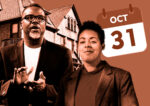Farzin Parang fears Chicago voters aren’t getting a fair shake at deciding a key city real estate policy.
That’s why the executive director of the Building Owners and Managers Association said the office property trade group filed suit against the city’s Board of Elections Commissioners. The complaint seeks to keep a property sales tax hike proposed by Mayor Brandon Johnson from appearing on the March 19 ballot.
Parang remains confident that BOMA and others in the real estate industry can sway enough city voters against Johnson’s plan to quadruple the one-time sales tax on the city’s biggest property trades.
But he also believes he shouldn’t have to.
His group, along with other local real estate trade organizations, filed a lawsuit Friday against the Chicago Board of Elections Commissioners that aims to stop the Johnson-proposed transfer tax hike from appearing on the spring ballot as City Council intended.
Here’s why they decided to file suit challenging the legality of the measure, instead of focusing on campaigning this month to get enough “no” voters to the polls to defeat the proposal.
- The lawsuit is focused on how the referendum is worded, including how the ballot measure poses three separate questions.
- It takes issue with the measure including both a tax decrease for the majority of residential transactions while simultaneously instituting a tax increase for many commercial deals.
- It combines a popular measure, that being the tax decrease for less expensive deals, with an unpopular measure, that being a tax increase on larger deals.
“I’m pretty confident that we can educate voters that the way it’s proposed is not in their interest, regardless of the lawsuit,” Parang said. “Having said that, the way that they’ve played this sort of politically cute game of combining these questions and doing this decrease we also think is unconstitutional, and it’s illegal.”
Under Johnson’s proposal, the real estate transfer tax rate would jump to 2 percent of the sale price for deals between $1 million and $1.5 million, while rising to 3 percent for transactions greater than $1.5 million. The rate would drop to 0.6 percent for property trades less than $1 million, affecting the majority of residential purchases. Despite its nickname as a mansion tax, both commercial and residential properties would be subject to the increases. The city’s current transfer tax rate is 0.75 percent for all property sales regardless of price.
The lawsuit isn’t meant to keep voters from making a decision, but to pre-empt legislative “logrolling,” when a popular measure is combined with a less popular measure to ensure the passage of both.
“The underlying issue with this referendum is that it tries to avoid that dialogue (about how to address homelessness) by cynically dangling a tax cut in front of part of the voting population to try to distract them, or make them think that the impact of this proposal is not going to be felt by everyone throughout the city,” Parang said.
City officials don’t need a referendum to lower the transfer tax rate on some portion of property sales, and could do so on their own, the plaintiffs have said since they filed the suit. But proponents of the measure packaged it with the tax hike on bigger deals to make that part of the proposal more palatable.
Johnson released a statement on Friday to note that the city administration is not a party to the lawsuit.
“From the city’s perspective, Bring Chicago Home will be on the ballot in March 2024, and Mayor Johnson believes it would create even more much-needed resources to address homelessness in our city and provide support for tens of thousands of our unhoused neighbors,” the mayor’s office said.
While the Board of Elections Commissioners said it is the wrong target of the lawsuit because it’s the City Council that initiated sending the measure to the ballot, Parang said the body is the correct defendant because it’s in charge of certifying referendums for the ballot.
Here is the wording on the ballot, via BOMA:
Shall the City of Chicago impose:
1. a real estate transfer tax decrease of 20% to establish a new transfer tax rate of $3 for every $500 of transfer price, or fraction thereof, for that part of the transfer price below $1,000,000 to be paid by the buyer of the real estate transferred unless the buyer is exempt from the tax solely by the operation of state law, in which case the tax is to be paid by the seller; AND
2. a real estate transfer tax increase of 166.67% to establish a new transfer tax rate of $10 for every $500 of transfer price, or fraction thereof, for that part of the transfer price between $1,000,000 and $1,500,000 (inclusive) to be paid by the buyer of the real estate transferred unless the buyer is exempt from the tax solely by the operation of state law, in which case the tax is to be paid by the seller; AND
3. a real estate transfer tax increase of 300% to establish a new transfer tax rate of $15 for every $500 of transfer price, or fraction thereof, for that part of the transfer price exceeding $1,500,000 to be paid by the buyer of the real estate transferred unless the buyer is exempt from the tax solely by the operation of state law, in which case the tax is to be paid by the seller?
Read more



